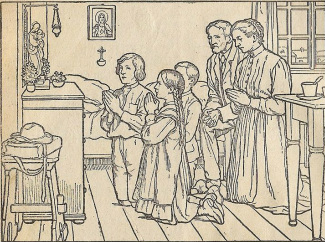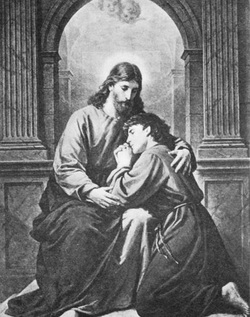
God is our Father and our greatest Benefactor. We owe Him all that we have, all that we are. Wherefore it is our sacred duty not only to feel grateful to Him for His numberless and priceless benefits, but also to acknowledge them and show Him our gratitude for them.
1. It is God who has created us out of His pure, gratuitous love, and given us our body with its senses and members, and our immortal soul, made after His own image and likeness, and endowed it with its wonderful faculties. He has preserved us and loaded us with benefits all the years we have lived. What should we be, if God had deprived us, as has happened to so many of our fellow-men, of some of His gifts, such as sight, hearing, speech, power of motion, strength, the use of our reason? We should have no reason to complain of it. But how grateful we should be to Him, for not having deprived us of them. Moreover, God has destined us to share forever His own happiness in heaven.
2. It is God the Son who has redeemed us from sin, from the power of the devil and from hell, by His sufferings and death. To Him we owe the gift of the true faith, that most precious of gifts, without which all His other gifts would not avail us for our salvation. He has restored to us sanctifying grace, and made the members of our body the temple of the Holy Ghost (I Cor. 6-19), and our bodies members of Himself (v. 15), and enabled us to merit heavenly bliss. For the forgiveness of our sinful ingratitude in offending Him and thereby deserving the torments of hell, He instituted the sacrament of penance, and to enable us to overcome the enemies of our salvation and lead a life worthy of Him, whose disciples and members we are, He instituted the sacrament of the Blessed Eucharist in which He becomes the heavenly, strengthening and vivifying food of our soul, and gives us audience whenever we wish, grants us all we ask Him, and protects us against all our enemies. "O God, my deliverer from my enemies. . . . Therefore will I give glory to Thee, O
Lord." (Ps. 17. 48-50.)
3. Just as a child is in duty bound to thank his parents for all that he receives from them, so we also should thank God for His benefits. "What shall I render to the Lord for all the things that He hath rendered to me? I will take the chalice of salvation; and I will call upon the name of the Lord. I will pay my vows to the Lord." (Ps. 115 3-5). "We are bound," says St. Paul, "to give thanks always to God" (2 Thess. I-3). "Giving thanks always for all things, in the name of our Lord Jesus Christ, to God and to the Father." (Eph. 5, 20). "Since there is not a single moment," says St. Bernard, "when we do not enjoy God s benefits, there should not be a single moment in which we do not think of and thank God." "God demands our gratitude, not as if He needed it," says St. John Chrysostom, "but that we may deserve and obtain fresh benefits from Him." The more grateful we are to God, the more numerous and great will be the graces and gifts He will bestow upon us. "You shall draw waters with joy out of the Saviour's fountains; and you shall say in that day: Praise ye the Lord and call upon His name" (Is. 12. 3).
4. Our divine Saviour Himself taught us, by His example, to thank God for His benefits, for hearing our prayers. "I thank Thee, O Father, because Thou hast heard Me" (John II, 41). The apostles also showed their gratitude to God, by thanking Him for His benefits. St. Paul repeatedly insists on the duty of thanking God: "In all things give thanks; for this is the will of God in Christ Jesus concerning all" (I Thess. 5. 18). But we fail in the honor we owe to God, for how neglectful we are in thinking on God's gifts to us, and on our obligation to thank Him for them with the persuasion of our own helplessness, of our total dependence upon Him. Gratitude is also an inducement and a help to make a proper use of His benefits,to combat sin; it also imparts to us confidence to receive future benefits, whenever we may need them. Thanking and praising God for His gifts is not only pleasing to Him, but also commanded by Him for our own benefit, and not because He Himself has any need of our gratitude. Our holy Mother the Church daily calls upon us, before the beginning of the Canon of the Mass, by the mouth of the priest: "Let us give thanks to our God : It is meet and just. It is truly meet and just, right and salutary that we should always give Thee thanks, O holy Lord Father al mighty and eternal, through Christ our Lord."
Hence it is our duty daily to thank God for His benefits, because
He daily bestows numberless benefits upon us both in the order of nature and in the order of grace. Let us never forget that of ourselves we are helpless; hence our divine Saviour says : "Without Me you can do nothing" (John 15- 5).
5. Our daily gratitude to God should consist, first, in a lively remembrance of God's benefits, the most of which we fail to notice, to remember, duly to appreciate, because they are of daily occurrence, such as health, the use of our senses; secondly, we should often recall our unworthiness of God's favors, on account of our sins and our carelessness and tepidity in His service; and thirdly, we should consider, especially, the infinite value of His daily graces, which are the price of the blood of Jesus Christ.
6. "Since there is not a single moment when we do not enjoy God s benefits," says St. Bernard, "there should not be a single moment in which we do not think of and thank God." But our gratitude to God should not consist in mere words; it should be like that of the grateful child. The truly grateful child shows his gratitude to his parents by something more than mere words, by his obedience and good conduct. Hence St. Augustine says: "He who wishes always to praise and thank God as he should, must perform his actions well, for they will then be a true praise of God." Elsewhere the same saint says: "Acknowledge that of thyself thou art and hast nothing good, so that thou shalt feel urged to be grateful to God." Let us also often think on the passion of Jesus Christ, and we shall learn therefrom the infinite debt we owe Him and be induced not only to be grateful to Him but also to love Him with all our heart. "We should," says St. Paulinus, "return our thanks and our love to Jesus Christ for all the sufferings and insults He endured for us." This should impel us to accept all that God sends us, whether it be good or evil.
"If we have received good things at the hand of God, why should we not receive evil? " (Job 2. 10). "Always thank God," says St. John Chrysostom, "whether good or evil happens to you ; if evil, it will be profitable to you (through your patience and resignation); if good, it will remain good."
Source: Sermon Matters, Imprimatur 1915








 RSS Feed
RSS Feed